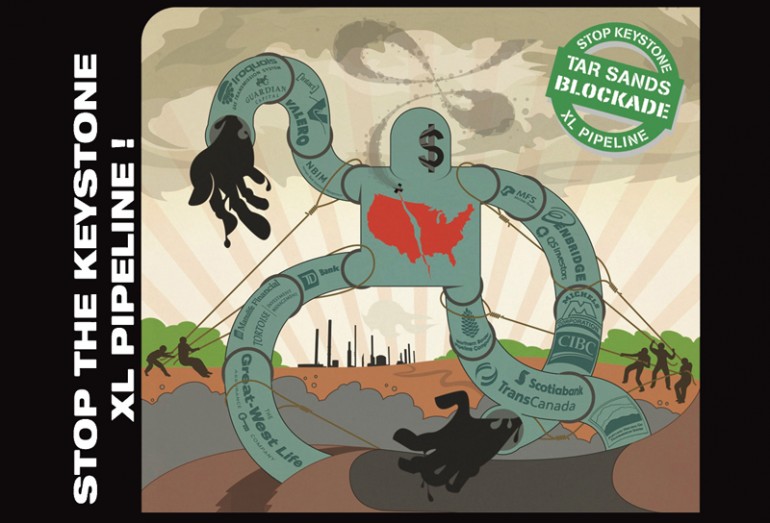Director John Fiege and Executive producer Daryl Hannah
Sometimes the battle in your own backyard represents a struggle on a global scale.
In the documentary Above All Else, which premiered at the SXSW Film Festival on March 10, a local conflict is in the national spotlight. The film follows the efforts of David Daniel, a landowner in East Texas, who joins up with fellow local residents and visiting activists to fight the installation of the southern stretch of the Keystone XL Pipeline by TransCanada, which would transport crude oil from the Alberta tar sands to terminals near the Gulf of Mexico.
With his legal options drying up, Daniel and several environmental activists create a treetop blockade on his property directly in the path of the proposed pipeline. It’s an emotional battle that hits close to home for many Texans, and one that director John Fiege and executive producer Daryl Hannah are hoping to attract even more attention to with their film.
Speaking to CultureMap, Fiege and Hannah discussed what first attracted them to the forests and pastures of East Texas, and why this location is the frontline in the global fight against climate change.
Fiege first learned of the tension brewing in East Texas while covering the aftermath of the BP oil spill, Fiege . “It really made my ears perk up, because it seemed like a sea-change in the way that the environmental movement was engaging with these issues. People were going back into the streets,” he says.
“Here are folks who are looking at a single project that has not been approved even. And they’re deciding to focus on that project and stopping it, and this is a proactive way to deal with climate change.”
For Hannah, the East Texas battle is an important measure in halting climate change on a global level. “It is one of most important conduits for the further expansion of the Alberta tar sands,” says Hannah. “It’s now the size of the UK and right now they have approvals that would make it the size of Florida. It’s the largest industrial project on the planet, and it’s also considered to be the most destructive industrial project on the planet.”
Hannah, who previously rallied opposition along the northern pipeline route in Canada and the U.S., was compelled to cover the South because of relative silence. “I was drawn to [Texas] because I realized this pipeline is a fuse to that expansion in Canada,” says Hannah. “I participated in some things along the northern route with the First Nations tribes and ranchers. And when I found out that the southern route was fast-tracked it wasn’t being covered at all. It was almost like it was done under the table.”
A company with the resources of TransCanada can afford to fast-track production of a pipeline thanks to robust financial resources, a privilege that families and individuals in rural East Texas are unable to match. In fact, Daniel was eventually forced to reach an agreement with TransCanada over fears that he would not be able to afford a potential lawsuit. Since then, Fiege says, the team hasn’t heard from Daniel nor has he been able to provide comments regarding the film.
“I don’t know the extent of it,” says Hannah, “but I got a message on Facebook from [Daniel’s] sister last night and she was irate in terms of the threats he’s up against if he says anything about the film.”
“I think one of the things the film reveals is the immense power that corporations now hold over our political system, our economic system and over people,” Fiege says. “I didn’t expect to find that story, but it’s the one that emerged.”
Following the premiere of the film at SXSW, Fiege and Hannah are planning an extensive fall tour of universities and community organizations where the film will be screened and the team can educate people on the issue at hand.
“It’s a human, universal story that we think people from all types of backgrounds are going to respond to, so we just to be out there with the film as much as possible and get people engaged and informed and talking about these issues,” says Fiege.






